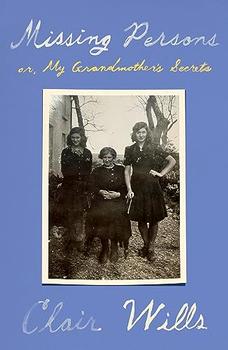Book Club Discussion Questions
Want to participate in our book club? Join BookBrowse and get free books to discuss!
Please be aware that this discussion guide will contain spoilers!
-
Clair Wills's Missing Persons is an intimate narrative that touches on universal themes of family, tradition, stigma, and silence. As Lucy Scholes wrote in the Financial Times, "Only [Clair Wills] could have written it, but it will speak to and about the lives of many." What facets of Missing Persons felt distinctly personal to you? When did it illuminate experiences everyone could understand? Did you see yourself reflected in the memoir? If so, where?
-
John Banville describes Missing Persons as an "expertly crafted work" that "conserves its revelations with all the skill of a master novelist." What revelations most surprised you, and why?
-
Discuss the book's distinct time and setting in nineteenth - and - twentieth century Ireland. What new aspects of Ireland's history, both uplifting and distressing, did the book reveal to you?
-
Throughout the memoir, Wills wrestles with whether she should tell Lily's and Mary's story, reflecting that "even talking or asking about what had happened felt somehow shameful" (46). Why might the author feel this way? What motivates her to continue her search? Have you ever confronted tough questions about your family's past? If so, what happened?
-
What role does the Catholic Church play in the lives of the people you meet in Missing Persons? Did your impressions of the Church change after reading this book? If so, how?
-
Wills and her mother share a unique dynamic. How would you describe their relationship? Why might the author feel like they're "both playing a game" (78) when they discuss their family's history?
-
What do you make of Philly's claim that Molly and Thomas "were Victorians" (64) as a way to justify their worldview? Should the attitudes and actions of the past be judged by the standards of the present? Why or why not?
-
In "My Grandmother's Secrets," we learn a shattering truth about Molly's daughter, Mary I (77). Discuss this heartbreaking revelation. What do you make of Molly and her mother's decision to hide what happened from the rest of the family? Why do you think Molly revealed the truth nearly thirty years later?
-
In her search for answers about Jackie and Lily, Wills considers the notion of choice, only to suspect she's asking the wrong questions: "It may not have felt like choice was part of the landscape at all" (150). Where do you see instances of individuals making their own choices in Missing Persons? When is someone held back from making a choice? Do you think Jackie or Lily had a choice in what became of him?
-
Discuss the role that secrets play in Missing Persons. When are secrets deemed necessary? When do they engender shame? When is secret keeping a type of power, especially among the women in the book? What role do secrets play in your life?
-
Molly's reaction to Jackie and Lily's relationship sends shock waves through her family. Why do you think she responded the way she did? What cultural, religious, or personal forces shaped her response? Could you find forgiveness for something like this if it happened in your family? Why or why not?
-
Discuss the consequences of Jackie leaving Ireland and his family for Britain. What does he lose? What does he gain? Why do you think the male emigrant laborer lifestyle that Jackie embodied "was a source of fascination for the Irish at home" (156) while nothing was said "about the women and children in the homes" and "very little was being said
about the women who emigrated" (162)?
-
This book explores the stories that we share—and choose not to share— with our loved ones. How are personal histories passed along in your family?
-
Wills was born in South London, yet her visits back to the family farm in Ireland are framed as "going 'home'" (8). What types of homes do you see in Missing Persons? Is everyone welcome? Why or why not? What makes a particular place—be it a country, a community, or something else entirely—feel like "home"?
-
Wills begins her memoir in search of answers about the missing persons in her family. What resolutions do you think she reaches by the end of the book? Does her perception of her family change? Did Missing Persons change how you view your family? If so, how?
For the full book club kit please refer to the publisher's page.
Unless otherwise stated, this discussion guide is reprinted with the permission of Farrar, Straus & Giroux. Any page references refer to a USA edition of the book, usually the trade paperback version, and may vary in other editions.
